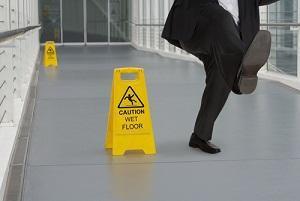 When you enter into or onto another person’s property, the owner of the property is responsible for making sure that you are safe. This does not mean that the property owner is necessarily tasked with protecting you from yourself, but it does mean that the premises must be kept free of hazards that could lead to a slip and fall or a trip and fall. If the owner fails to keep the property safe and you are injured as a result, you may be able to collect compensation under the principles of premises liability.
When you enter into or onto another person’s property, the owner of the property is responsible for making sure that you are safe. This does not mean that the property owner is necessarily tasked with protecting you from yourself, but it does mean that the premises must be kept free of hazards that could lead to a slip and fall or a trip and fall. If the owner fails to keep the property safe and you are injured as a result, you may be able to collect compensation under the principles of premises liability.
Recovering damages after a slip and fall injury will require you—with the help your attorney—to prove four basic elements:
A Duty of Care
The first thing you must prove is that the person or entity from whom you are seeking compensation actually owed you a duty of care. In other words, you must show that the defendant is the owner of the property in question or is otherwise responsible for the condition of the premises. The duty of care owed by a property owner may also depend on your reasons for being on the property. For example, if you were injured in a store during normal business hours, the duty of care owed to you would be greater than if you had broken in late at night.
Existence of a Hazard
Next, you must prove that a dangerous condition existed on the property. A dangerous condition may include a wet floor with no signage, merchandise stacked in an unsafe manner, broken stairs, missing railings, and much more. To be considered a dangerous condition, the problem must be capable of causing injury.
Awareness of the Problem
You will also need to show that defendant knew that the dangerous condition had the potential to cause harm. If the defendant claims that he or she did not know, you may be able to prove that the defendant should have known. The defendant’s awareness may be affected by how long the condition existed. An owner should be aware of floor tile that has been broken for weeks, but he or she may not have had time to find out about a spilled drink before someone slips and falls.
You Suffered Harm
Finally, your case will depend on your ability to show that the dangerous condition in question caused you to suffer injuries. How the accident happened may also play a role at this stage. For example, if the owner knew about a dangerous condition and marked the area with signs and cones, an average person would probably notice the warnings. If you were distracted by your cell phone and you walked into the dangerous are anyway, your ability to collect may be compromised. In such a case, it could be argued that your distraction caused your injuries more directly than the dangerous condition did.
Contact a Premises Liability Lawyer
If you have been injured while on someone else’s property, an experienced East Hartford personal injury attorney can help you explore your options for collecting compensation. Call 860-290-8690 for a free, no-obligation consultation and case evaluation at Woolf & Ross Law Firm, LLC today.
Source:
https://www.reuters.com/article/businesspropicks-us-findlaw-the-small-bu/the-small-business-owner-and-slip-and-fall-accidents-overview-idUSTRE5314J320090402
 50 Founders Plaza
50 Founders Plaza

